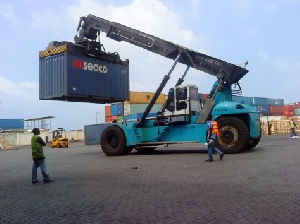Tax experts have asked the government to stop with immediate effect the operations of Destination Inspection Companies (DICs) at the country’s ports in order for the state to realise its projected tax revenue and also reduce perennial congestion at the ports.
Former Commissioner of the Customs Division of Ghana Revenue Authority (GRA) Major Daniel Ablorh-Quarcoo (rtd.) and a tax-Lawyer, Abdallah Ali-Nakyea of WTS Tax Consulting, have both accused the DICs of dampening government’s efforts to mobilise tax resources and also reduce the cost of doing business in the country.
They argue that the country’s import tax and business operating regime would best be served by entrusting assessment of import duties to the Customs Division of the GRA.
Major Ablorh-Quarcoo (rtd.) said DICs make doing business in Ghana more expensive because they charge a fee for every work that they do.
“But for customs, once they have done the work there are no more fees and levies to be collected. So if for nothing else, if we get rid of DICs we are actually reducing the cost of doing business -- and the net effect is that profits will increase and more taxes can be collected.
“This is simple arithmetic and someone should tell the Trade Ministry that they are doing more harm than good by retaining the DICs.
“They should allow the Finance Ministry to use the Customs Division of the GRA to assess and collect the taxes,” said Major Abloh-Quarcoo (rtd.).
Mr. Ali-Nakyea added: “The phasing out of DICs is long overdue and steps indeed need to be taken to get Customs Division to take over their core function of Customs valuation, which enables the right duties to be assessed and collected rather than their current supervisory role over DICs.”
The two tax experts made their observations last week at a seminar organised by the Pentecost University College Graduate School to discuss government’s 2014 budget statement presented to parliament a couple of weeks ago.
The seminar was on the theme “The 2014 budget statement in perspective: an analysis of the resource mobilisation initiatives”, as part of the school’s regular practitioner sections instituted to build the theoretical and practical capacity of students.
Major Abloh-Quarcoo (rtd.) said it is inconceivable that after many years of importers’ and tax authorities’ displeasure at the DICs’ work, the companies still have the space to operate at the country’s ports -- unnecessarily causing problems to all stakeholders.
“DICs were supposed to cease operation in 2009. Somehow, because of a change of government, they survived and are now going beyond the mandate they were asked to carry out.”
DICs were mandated 13 years ago to inspect imports at the country’s port of clearance in a bid to replace pre-shipment Inspection, which involved inspection of imports before shipment from the country of supply.
After over a decade of operation, DICs have come under criticism in their operational activities for their arbitrary charges at the ports and work processes which importers claim cause congestion at the ports because of their many interventions -- either by evaluation or reclassification or both, or by scanning discrepancies.
While many stakeholders including the Ministry of Finance have called for the DIC concept to be scrapped at the ports, the Ministry of Trade & Industries has backed the companies -- contending the DICs have operated efficiently over the years to enhance government’s revenue through their interventions.
Business News of Monday, 9 December 2013
Source: B&FT
Gov’t must scrap DICs - Tax experts
Entertainment












